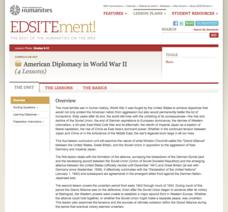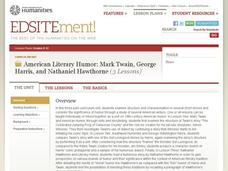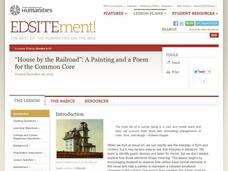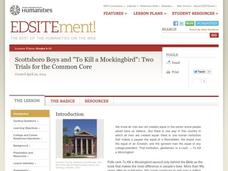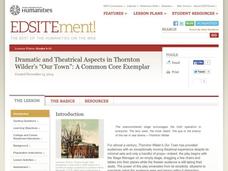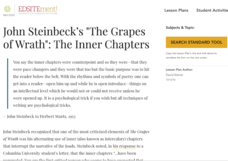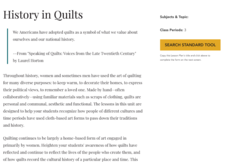National Endowment for the Humanities
In Her Shoes: Lois Weber and the Female Filmmakers Who Shaped Early Hollywood
Lois Weber has been forgotten. So have Dorothy Davenport Reid, Gene Gauntier, and many others. High school sleuths use advanced search engines to investigate these women and discover clues to their disappearance from filmography and...
National Endowment for the Humanities
People and Places in the North and South
North and South: two opposite directions and two opposite economic and social systems in time of the Civil War. Pupils peruse census websites and primary source photographs to understand what life was like for the everyday person before...
National Endowment for the Humanities
James Madison: Madison Was There
Madison was there! Scholars go on a journey to discover the person behind the founding father label as they explore James Madison's role in the formation of the United States government. The culmination is a writing assignment and...
National Endowment for the Humanities
American Diplocmacy in World War II
The end of World War II saw the world deeply changed over the last few years. Four thorough lessons explore post-war Europe, America, and Asia through reading assignments and discussion questions about the Grand Alliance and the signing...
National Endowment for the Humanities
American Literary Humor: Mark Twain, George Harris, and Nathaniel Hawthorne
Nathaniel Hawthorne as a humorist? Really? The three lessons in this series focus on the the storytelling style, conventions, and literary techniques employed by Hawthorne, George Washington Harris, and Mark Twain.
National Endowment for the Humanities
Chronicling America: Uncovering a World at War
As part of a study of World War I, class members read newspaper articles from the time that urge American involvement, non-involvement, or neutrality. Using the provided worksheet, groups analyze the articles noting the central argument...
National Endowment for the Humanities
Galileo: Revealing the Universe
To gain an understanding of the significance of Galileo Galilei's revolutionary ideas, class members watch the short video "Stargazing Before Galileo," and conduct a close reading of Galileo's Sidereal Messsenger. They then compare...
National Endowment for the Humanities
David Walker vs. John Day: Two Nineteenth-Century Free Black Men
What was the most beneficial policy for nineteenth-century African Americans: to stay in the United States and work for freedom, or to immigrate to a new place and build a society elsewhere? Your young historians will construct an...
National Endowment for the Humanities
“Twelve Years a Slave”: Analyzing Slave Narratives
Readers of Solomon Northup's brutally frank slave narrative Twelve Years a Slave examine passages that support the argument that slavery "undermined and corrupted" the institution of marriage. Background information is provided by a...
National Endowment for the Humanities
“House by the Railroad”: A Painting and a Poem for the Common Core
Introduce your class to ekphrastic poetry with an exercise that asks them to examine Edward Hooper's painting House by the Railroad and Edward Hirsch's poem "Edward Hopper and the House By the Railroad." After a close reading of the two...
National Endowment for the Humanities
The House Un-American Activities Committee
Was the House Un-American Activities Committee justified in investigating subversive influences in the entertainment industry? Part two of the three-part series of lessons that examine the anti-communism movement after World War II,...
National Endowment for the Humanities
Scottsboro Boys and "To Kill a Mockingbird": Two Trials for the Common Core
Here's a must-have resource for anyone reading To Kill A Mockingbird or using Harper Lee's award-winning novel in a classroom. The packet contains Miss Hollace Ransdall's first-hand, factual account of the trials of the Scottsboro Boys,...
National Endowment for the Humanities
The Argument of the Declaration of Independence
When in the course of a course on historic American events, it becomes necessary for learners to examine, with decent respect, the Declaration of Independence, it becomes evident that there are six separate and equal parts of that...
National Endowment for the Humanities
Dramatic and Theatrical Aspects in Thornton Wilder’s “Our Town”: A Common Core Exemplar
“So I’m going to have a copy of this play put in the cornerstone and the people a thousand years from now’ll know a few simple facts about us.” Our Town is used as the text in a Common Core exemplar that examines the dramatic and...
National Endowment for the Humanities
A “New English” in Chinua Achebe’s “Things Fall Apart”: A Common Core Exemplar
To examine the “New English” Chinua Achebe uses in Things Fall Apart, readers complete a series of worksheets that ask them to examine similes, proverbs, and African folktales contained in the novel. Individuals explain the meaning...
National Endowment for the Humanities
John Steinbeck’s "The Grapes of Wrath": The Inner Chapters
Here’s a must-have resource for anyone using The Grapes of Wrath. Everything from guiding questions to background information, from photographs to documentary films, from activities to assessments is included in a richly detailed packet...
National Endowment for the Humanities
Courage “In the Time of the Butterflies”: A Common Core Exemplar
The courage of Las Mariposas, the Mirabal sisters, is the focus of a series of activities designed to accompany a reading of In the Time of the Butterflies that ask readers to consider what it means to be courageous. Beautifully crafted...
National Endowment for the Humanities
Martin Luther King, Jr. and Nonviolent Resistance
Was nonviolent resistance the best means of securing civil rights for black Americans in the 1960s? For this highly engaging and informative lesson, your young historians will closely analyze several key documents from the civil rights...
National Endowment for the Humanities
On This Day With Lewis and Clark
Walk in the footsteps of Lewis and Clark as they discover the wonders, beauty, and dangers of the American frontier. After gaining background knowledge about Thomas Jefferson and the Louisiana Purchase, young explorers use primary...
National Endowment for the Humanities
Cultural Change
High schoolers research the passage of the 19th Amendment as an illustration of the mutual influence between political ideas and cultural attitudes. They also read the Seneca Falls Declaration and explore the cultural shifts it both...
National Endowment for the Humanities
History in Quilts
Learners investigate the use of cloth-based art forms intended to pass down traditions and history. They research types of quilts, quilt characteristics and then identify how Freedom Quilts were historically used in the US.
National Endowment for the Humanities
Hamlet Meets Chushingura: Traditions of the Revenge Tragedy
Young scholars read texts, view film and video and conduct research in an analysis and comparison of Shakespeare's "Hamlet" and the Kabuki piece "Chushingura". They focus their analysis on the theme of revenge.
National Endowment for the Humanities
Arabic Poetry: Guzzle a Ghazal!
Students research the evolution and cultural significance of the Arabic ghazal form of poetry. They, in groups, compose an original ghazal poem and read it aloud to the class.
National Endowment for the Humanities
Not 'Indians,' Many Tribes: Native American Diversity
Students explore what they thought they knew about "Indians." They examine the Hopi, Abeneki and Kwatiutl tribes in a game-like activity using archival documents.





